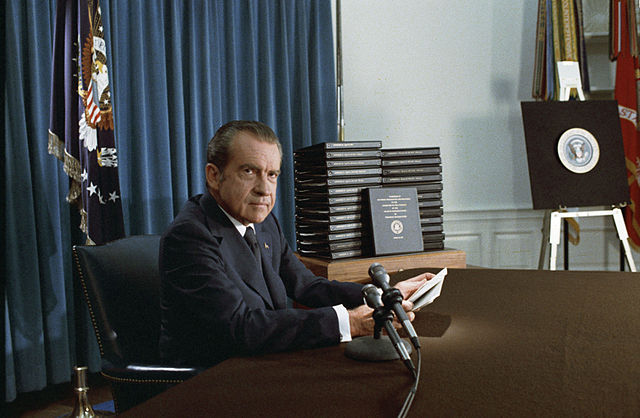
Why did the Watergate Hotel cause the downfall of Nixon? It didn’t necessarily cause his downfall, but it was the first domino that fell, and it was his coverup of what happened that sealed his fate.
Richard Nixon became president in 1968, beating the Democratic candidate Hubert Humphrey, who was the vice president at the time. He replaced Lyndon B Johnson and became the 37th president of the United States. LBJ had become president after the assassination of John F Kennedy and he decided not to stand for reelection. The democrats were in power at the time, but they were having a lot of trouble with the increasing problem of Vietnam and there were a lot of protests against them. Despite that, the election was a lot closer than people thought and Nixon only got 500,000 more votes than Humphrey. Nixon pledged to unite the country that was becoming increasingly divided.
Nixon had a very successful first term and he accomplished many things. Unfortunately, nobody remembers any of that. The only thing Nixon is really remembered for is Watergate. So, what did he accomplish? He mostly ended segregation in schools (only 8% by the end of his term) by offering schools financial incentives to integrate. He worked hard to protect the environment by creating the Environmental Protection Agency. He was the president when Neil Armstrong landed on the moon. He ended the military draft and he pulled all of the US troops out of Vietnam. He worked hard to ease the cold war tensions with the Soviet Union by taking part in the Strategic Arms Limitation Talks and signing the Anti-Ballistic Missile Treaty. He enabled the FBI and a Special Task Force to take on organized crime. He managed to open up China by being the first president to visit. He did many other things as well. He was so successful and popular that when he stood for reelection in 1972, he won with 67% of the vote, a landslide. And yet, we don’t remember or even know any of this. To us, he will always be the Watergate president and the president that recorded all of his conversations in the White House.
It is worth noting that Nixon wasn’t the first president to record conversations in the White House. Several presidents had done so because it was easier than having a note taker and it proved to be a more accurate record of what happened. It could be used in disputes and presidents knew that it would be useful when they came to write their memoirs. LBJ had used a system and Nixon heard about it in 1971, just over halfway through his first term. He decided to keep using the system and made it voice activated. One of the problems for him later on was that the system was a secret, which made it look far more sinister than it really was.
So, what happened at the Watergate Hotel? Nixon ended up winning the 1972 election by a landslide, but he had no way of knowing that before it happened. Several members of the campaign to reelect Nixon in 1972 decided that it might be a good idea to tap the phones and put recording devices in the offices of the Democratic National Committee’s headquarters, which was located in the Watergate Complex in Washington D.C. They successfully carried out the wiretapping in May of 1972 and were able to listen in to important campaign conversations. However, in June of the same year, the devices appeared to have stopped working and the group decided to break into the offices to repair them. After midnight on Saturday, June 17th, they attempted to break in, but a security guard noticed and called the police. 5 men were arrested and tried in September of 1972. Nixon hadn’t authorized any of this and he didn’t even know about it until after everything had happened.
While the 5 men were being tried and sentenced, the press got a hint that they were part of a bigger cover up and they began to dig deeper. They traced the money and discovered that it came from Nixon’s reelection committee. In January of 1973, the five “burglars” were given very long sentences to try and make them talk. An informant from the FBI was also talking to the press and the investigations began to head towards the president. In 1973, members of the White House testified before a grand jury and announced that the president had secret conversations he had recorded in the White House. The investigators wanted to get their hands on these, and the president refused. Finally in 1974, he gave in and handed over the recordings.
So, what had he done? Initially, nothing. He didn’t know about the wiretapping or the break-ins and if he had left it there, probably nothing would have happened. However, because he thought the scandal would reach him, when he found out about the wiretapping and that the FBI was investigating, he got the CIA to intervene. And that was the problem. He denied it and denied it, but when he handed over the tapes, one of them had clearly recorded the conversation where he asked his aides to get the CIA involved. And that was that. His support disappeared, the likelihood he would be impeached rocketed, and he resigned. His successor, Gerald Ford pardoned him, but the damage was done. And now the only thing we remember about Nixon is Watergate and his “I am not a crook” phrase. And that is what I learned today.
Image By National Archives & Records Administration – http://www.fordlibrarymuseum.gov/museum/exhibits/watergate_files/content.php?section=4&page=a&zoom=1, Public Domain, https://commons.wikimedia.org/w/index.php?curid=2458862
Sources
https://en.wikipedia.org/wiki/Watergate_scandal
https://en.wikipedia.org/wiki/Richard_Nixon
https://www.history.com/topics/1970s/watergate
https://en.wikipedia.org/wiki/List_of_presidents_of_the_United_States
https://www.spectator.co.uk/article/is-nixon-the-most-misunderstood-president-in-history
https://history.state.gov/milestones/1969-1976/ending-vietnam

Pingback: What does it mean to impeach a president?